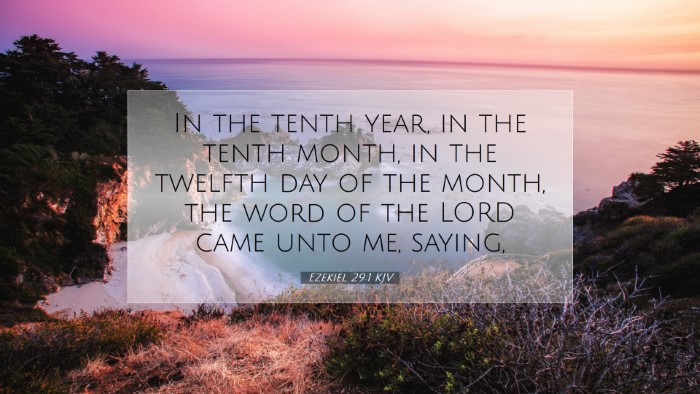Ezekiel 29:1 - Commentary and Insights
Ezekiel 29:1 (KJV): "In the tenth year, in the tenth month, in the twelfth day of the month, the word of the LORD came unto me, saying."
Introduction
The Book of Ezekiel is rich with symbolic imagery and profound messages for God’s people. In this particular verse, we see a moment of divine revelation that marks a significant point in the prophetic ministry of Ezekiel. Understanding this passage requires an engagement with the historical context, theological implications, and its relevance to the contemporary reader.
Context and Significance
Historical Context:
This verse situates Ezekiel’s prophecies within specific chronological markers, which serve to ground the spiritual messages in reality. Ezekiel begins with precise dating, which not only enhances the authenticity of the prophetic word but also underscores the seriousness of the proclamation. The mention of the tenth year of Jehoiachin’s captivity places this prophecy approximately two years after the fall of Jerusalem, indicating a time of deep despair for the Israelites.
Theological Implications:
The opening of this chapter with the reaffirmation of “the word of the LORD” emphasizes the authoritative and active nature of God's communication with His people. It reaffirms that despite their circumstances, God continues to speak and engage with them. This period of prophetic silence is shattered as God unveils His purposes and plans, thereby highlighting His sovereignty even in dire situations.
Commentary
Insights from Matthew Henry:
Henry notes the importance of the timing in this verse. He states that the specification of the date signifies God’s meticulous involvement in the affairs of humanity and emphasizes that prophecies were given to awaken a sense of accountability. He asserts that God’s words are not to be taken lightly; they come to the people as both a warning and a source of hope, which is vital during a time of judgment.
Insights from Albert Barnes:
Barnes elaborates on the significance of the word of the Lord coming to Ezekiel. He observes that the prophetic message serves as a divine revelation intended to instruct, warn, and comfort the people. The specificity of time reflects God’s precision and should encourage believers that God is actively involved. This relevance extends even into the New Testament, where the timing of God’s revelations plays a crucial role in the unfolding of His redemptive plan.
Insights from Adam Clarke:
Clarke emphasizes the notion that every pronouncement of judgment is accompanied by a potential for change and redemption. He points out that the message here is not solely one of condemnation but is intertwined with the promise of restoration. He expresses that Ezekiel's role as a prophet is not just to declare judgment but also to indicate the path towards reconciliation and renewal for Israel.
The Role of Prophecy in Ezekiel
Throughout the Book of Ezekiel, the prophetic word serves multiple purposes:
- Revelation: The messages received by Ezekiel reveal God's character, His intentions, and the state of the people.
- Warning: Many of Ezekiel’s prophecies serve as warnings against continued disobedience and idolatry.
- Hope: Interwoven with messages of judgment are promises of future restoration and hope, which are crucial for the people in exile.
Application for Today
For Pastors:
Pastors can glean from Ezekiel's prophetic declaration the importance of timely and relevant teaching that speaks to the current situation of their congregations. Understanding contextual cues within scripture allows for messages that resonate deeply with the struggles and circumstances of modern believers.
For Students:
This verse serves as a reminder of the importance of context and chronology in biblical studies. Students learning about the prophetic literature can appreciate the structured approach of Ezekiel’s writing and the implications of these details on the interpretation of prophecy.
For Theologians:
Theologically, the understanding of God's ongoing revelation speaks to the very nature of how God interacts with humanity. The ongoing themes of judgment and grace should be carefully examined within the broader scope of scriptural truth and the character of God throughout history.
For Bible Scholars:
Scholars are encouraged to consider the literary and historical aspects of Ezekiel’s writing. Analyzing the structure of prophetic messages and their impact on the audience allows for a deeper understanding of the intentions behind such proclamations.
Conclusion
The first verse of Ezekiel 29 sets the stage for a series of revelations that speak to both the state of Israel and the nature of God’s word. It invites reflection on divine communication and highlights the balance between judgment and mercy. This very duality is a reflection of God's character, which remains unchanged throughout the scriptures and calls for an engaged response from all who hear His word.


